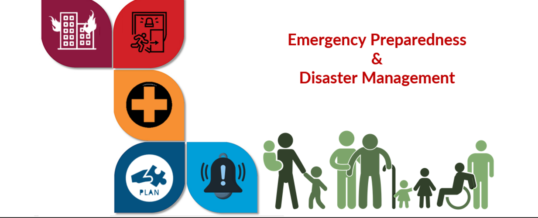
Safety in schools encompasses a wide range of considerations, requiring careful attention to various aspects in order to mitigate risks. Among these crucial factors, one of the key elements for ensuring safety is effective emergency preparedness and disaster management.
Emergency preparedness and effective disaster management are vital for ensuring the safety and well-being of students and staff in schools across India.
By prioritizing proactive planning and implementing robust strategies, educational institutions can effectively respond to crises and minimize potential risks. In this blog, we will delve into the importance of emergency preparedness and disaster management in schools, highlighting the benefits, emphasizing the significance of training, and exploring how safety audits and trainings contribute to overall preparedness for emergencies.
Importance of Emergency Preparedness in Schools: Emergency preparedness in schools is of paramount importance as it serves to protect the lives and well-being of students, staff, and the entire school community. Schools are not immune to various emergencies, including natural disasters, medical emergencies, and security threats. By establishing comprehensive emergency plans, schools can minimize chaos, facilitate prompt and effective response, and ensure the safety of everyone involved. A well-prepared school is better equipped to handle emergencies, maintain order, and provide reassurance to students, parents, and staff.
Benefits of Effective Disaster Management: Effective disaster management in schools yields numerous benefits. It allows for a swift and organized response during emergencies, minimizing the potential for injuries and loss of life. Additionally, it helps to mitigate property damage and ensure continuity of educational activities. A comprehensive disaster management plan also helps create a sense of security and confidence within the school community, fostering a conducive learning environment. By being prepared, schools demonstrate their commitment to the safety and well-being of students and staff, promoting trust and reassurance among parents and guardians.
Significance of Training in Emergency Preparedness: Training plays a pivotal role in ensuring effective emergency preparedness in schools. Educators and staff members need to be equipped with the knowledge, skills, and confidence to handle emergency situations promptly and efficiently. Training programs should cover various aspects such as emergency response protocols, first aid and CPR techniques, evacuation procedures, and effective communication during crises. By providing comprehensive training, schools empower their staff to respond effectively to emergencies, thereby reducing panic, ensuring student safety, and minimizing the potential for further harm.
Role of Safety Audits and Trainings in Preparedness: Safety audits and trainings serve as crucial tools in assessing and enhancing the preparedness of schools for emergencies. Safety audits involve comprehensive assessments of the school’s infrastructure, policies, and procedures to identify potential vulnerabilities and areas of improvement. These audits help in identifying shortcomings in emergency preparedness and enable schools to implement necessary measures to address them.
On the other hand, safety trainings focus on equipping educators, staff, and students with the knowledge and skills required to respond to emergencies effectively. These trainings encompass topics such as emergency drills, first aid and medical response, fire safety, and security protocols. By conducting regular safety trainings, schools create a culture of preparedness and ensure that all members of the school community are aware of their roles and responsibilities during emergencies.
Emergency preparedness and disaster management in schools are crucial for safeguarding the lives and well-being of students, staff, and the entire school community. By prioritizing proactive planning, investing in comprehensive training programs, and conducting regular safety audits, schools can effectively respond to emergencies, minimize risks, and provide a secure learning environment for all.
JUN
2023
